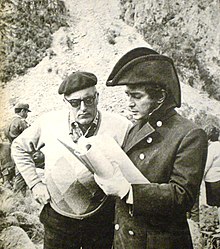Alfredo Alcón
Alfredo Alcón | |
|---|---|
 | |
| Born | Alfredo Félix Alcón Riesco 3 March 1930 Buenos Aires, Argentina |
| Died | 11 April 2014 (aged 84) Buenos Aires, Argentina |
| Occupation | Actor |
| Years active | 1955–2014 |
Alfredo Félix Alcón (Spanish pronunciation: [alˈfɾeðo alˈkon]; 3 March 1930 – 11 April 2014) was an Argentine theatre and film actor born in Buenos Aires. Widely regarded as one of the best and most important Argentine actors of the 20th century.[1]
He worked in more than 50 movies since his first one,
He died on April 11, 2014, at the age of 84.[4]
Biography
Alfredo Alcón was born on March 3, 1930, in Liniers. His family has Spanish ancestry: his paternal grandmother immigrated from Cádiz, and his mother from Castile. As a result, he had a fluent Spanish accent, which helped him when he worked in Spain.[5] His father died soon after his birth, and so the family moved to Ciudadela, Buenos Aires. One of his early influences was Richard III by William Shakespeare, which he read at the age of 11.[6]
He began working as a radio host, announcing news from the Liniers market (the main market of livestock in Argentina).
He made his most successful films with the director
He has worked in theater as well, both as actor and director. Some of his plays were directed by Margarita Xirgu, Carlos Gandolfo and Omar Grasso, and he directed the plays Los caminos de Federico, Bocca-Alcón, Homenaje Ibsen, ¡Shakespeare todavía! and Final de partida.[5] He played Hamlet during the Dirty War, amid concerns for its potential political connotations.[6]
His last work in television was a cameo in Herederos de una venganza (2011), as the leader of a masonic lodge. He had worked before in Por el nombre de Dios and Vulnerables (both from 1999). He also worked in the play Los reyes de la risa with Guillermo Francella.[6]
Alcón was hospitalized on November 28, 2013.

Selected filmography
- Love Never Dies (1955)
- Sugar Harvest (1958)
- The Candidate (1959)
- Summer Skin (1961)
- The Innocents (1963)
- Martín Fierro (1968)
- El Santo de la Espada (1970)
- The Seven Madmen (1973)
- Nazareno Cruz and the Wolf (1975)
- What's Autumn? (1977)
- Son of the Bride (2001)
- In the City Without Limits (2002)
References
- ^ "Alfredo Alcón: a cara limpia". LaNacion.com.ar (in Spanish). 2005-03-20. Archived from the original on 2021-07-22. Retrieved 2019-09-27.
- IMDb
- ^ "Alfredo Alcón". Konex Foundation (in Spanish). Archived from the original on 2001-11-28. Retrieved 2019-09-27.
- ^ "Murió Alfredo Alcón, el maestro del escenario" [Alfredo Alcón, the master of the stage, died]. Ambito (in Spanish). 2014-04-11. Retrieved 2019-09-27.
- ^ a b c d Silvina Ajmat (2014-04-11). "Murió Alfredo Alcón, el primer actor argentino" [Alfredo Alcón, the main Argentine actor, died] (in Spanish). La Nación. Retrieved 2019-09-27.
- ^ a b c d e "Murió Alfredo Alcón" [Alfredo Alcón died] (in Spanish). Clarín. 2014-04-11. Retrieved 2019-09-27.
- ^ "Alfredo Alcón, internado" [Alfredo Alcón, hospitalized] (in Spanish). Clarín. 2013-11-28. Retrieved 2019-09-27.
- ISBN 978-1-4766-1961-3.
- ^ "El último adiós a Alfredo Alcón" [The last goodbye to Alfredo Alcón] (in Spanish). Clarín. 2014-04-12. Retrieved 2019-09-27.
External links
- Alfredo Alcón at IMDb
- "Alfredo Alcón". CineNacional.com (in Spanish). Retrieved 2019-09-27.
